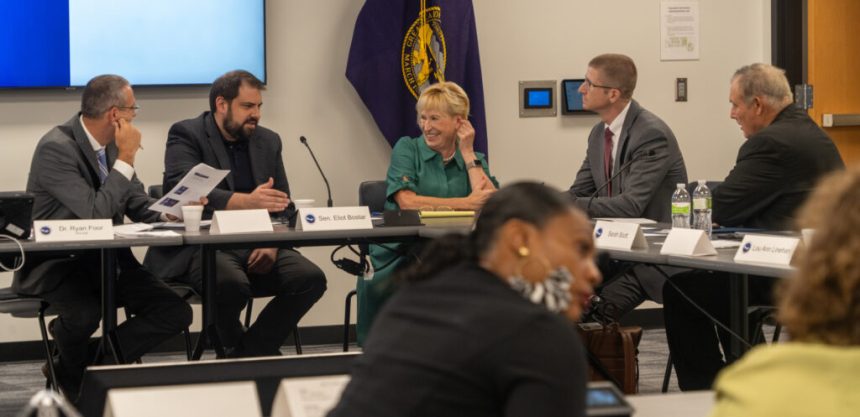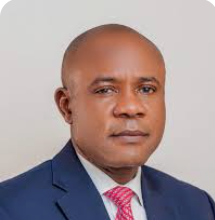Superintendent Aaron Plas of Bennington Public Schools, State Sen. Eliot Bostar of Lincoln, former State Sen. Lou Ann Linehan of the Elkhorn area, Superintendent John Schwartz of Millard Public Schools and Lakeview Community School Board President Keith Runge, from left, meet during the inaugural meeting of the Nebraska School Financing Review Commission. Aug. 12, 2025. (Zach Wendling/Nebraska Examiner)
LINCOLN — A new state commission charged with reviewing and suggesting updates to how Nebraska funds its public K-12 schools kicked off its first meeting Monday largely with a consensus that the state should dole out more aid to local schools.
The work of the new School Financing Review Commission revolves around property taxes and state income and sales tax dollars distributed under Nebraska’s Tax Equity and Educational Opportunities Support Act, better known as TEEOSA or state aid formula. The formula, at a basic view, considers a district’s “needs” minus its “resources.” A district receives “equalization aid” if it has a positive balance.
Nebraska Gov. Jim Pillen, center, addresses the new School Financing Review Commission during its first meeting. Aug. 12, 2025. (Zach Wendling/Nebraska Examiner)
For the 2025-26 school year, TEEOSA is calculated between 18 “needs,” such as addressing student growth, poverty or English language learners, and six “resources,” including some income tax funds in a given district and how much a district could collect if it taxed the property within its boundaries at $1.
While all schools receive some level of state funding, only 50 of the state’s 245 school districts are equalized, a calculation that fluctuates annually in part because of property valuations.
Gov. Jim Pillen, addressing the commission Tuesday, asked that commissioners leave any preconceived ideas behind and look at what’s best for Nebraska and its schools.
“It’s critical, we all agree, you never, ever, give up on a kid,” Pillen said. “Can’t let one be left behind.”
Brady Public Schools Superintendent Ann Foster, one of 17 members of the mostly governor-appointed commission, which still has one vacancy still to fill, said she recognizes the work is twofold: property tax relief while keeping kids at the “heart” of all decisions.
TEEOSA basics
Local school property taxes accounted for about $2.9 billion of a $5.3 billion total in property taxes collected statewide last year. Schools receive about $5 billion in total revenue each year, including federal and general state aid plus state dollars meant to offset some local property taxes through tax credits.
Voters prohibited the state from levying separate property taxes in 1966.

State Sen. Jana Hughes of Seward, center, one of three current senators who sits on the new School Financing Review Commission as nonvoting members. Aug. 12, 2025. (Zach Wendling/Nebraska Examiner)
Pillen and state lawmakers took a first stab at addressing TEEOSA after he took office in 2023 by establishing baseline “foundation aid” for each district — $1,500 for K-12 students plus $900 for pre-K students.
State Sen. Jana Hughes of Seward, one of 18 commissioners and vice chair of the Legislature’s Education Committee, passed the legislation this spring establishing the new financing commission to suggest possible tweaks to TEEOSA. The formula has been perennially updated since its creation in 1990.
A lawmaker-led committee thought up TEEOSA and a similar school financing review commission took effect after it passed. That group disbanded in 2002.
State law requires the new commission to produce a first report of recommendations by Dec. 1, with most commissioners saying they want to meet at least monthly until then.
‘Overreliance’ on property taxes
During Tuesday’s meeting, the commission broke into small groups to think up goals for the commission — with agreement there must be a balance among revenue sources, including as funding variables change.

Nebraska’s new School Financing Review Commission meets for the first time. Gov. Jim Pillen, front-center, addresses the group. Aug. 12, 2025. (Zach Wendling/Nebraska Examiner)
In large part, commissioners said they want to get away from an “overreliance” on property taxes.
Millard Public Schools Superintendent John Schwartz said his group wanted to highlight sustainability and predictability for school districts, the state and taxpayers. But he said doing so should not erode intended property tax relief efforts, which his group said “might add value.”
State Sen. Dave Murman of Glenvil, chair of the Legislature’s Education Committee, suggested educating the public about TEEOSA could be a good focus, too. Schwartz and former State Sen. Lou Ann Linehan of the Elkhorn area agreed. Linehan chaired the Legislature’s Revenue Committee for six years.
“If it was simpler, I think, and people understood it better, school funding would even have more support than it does now,” Murman said.
Operational expenses
Other commissioners, such as Hughes and Nebraska State Treasurer Tom Briese, suggested long-term plans that would have the state assume greater responsibility for school funding.

Nebraska Treasurer Tom Briese of Albion, left, and Dave Murman of Glenvil, chair of the Legislature’s Education Committee, talk during a break of a School Financing Review Commission meeting. Aug. 12, 2025. (Zach Wendling/Nebraska Examiner)
Hughes, vice chair of the Education Committee, highlighted a long-term goal to push school property tax rates closer together, which vary between 30 cents and $1.05 per $100 of property valuations. Her original bill in the spring, which included the commission, also sought to do this.
However, Hughes’ original plan, which had earned the backing of Pillen and many school and ag advocates, needed about $120 million in state funding to work.
That remained out of reach with current tax revenues, as the state continues to face budget woes and as lawmakers reject suggestions to add sales taxes to goods and services currently exempt from them or to increase taxes on tobacco or vape products.
Briese again suggested the state take on the operational expenses of local schools, 80% of which are staff salaries and benefits, an idea Briese, Pillen and other lawmakers tried to rally behind in summer 2024.

A small group of the School Financing Review Commission meets during its inaugural meeting. From left: Superintendent Jason Dolliver of Pender Public Schools, Nebraska Treasurer Tom Briese, Omaha School Board member Shavonna Holman, Nebraska Property Tax Administrator Sarah Scott of North Platte and State Sen. Jana Hughes of Seward. Aug. 12, 2025. (Zach Wendling/Nebraska Examiner)
That model would be similar to the state assuming the property tax side of community college through 2023 legislation led by Briese and Murman. That law allows community colleges to go back to property taxes if state funding from mostly sales and income taxes falls.
“It’s aspirational at this point,” Briese said. “It’s going to be hard to get there any time real soon, but I think we ought to work through that, figure out how we can do that and try to set ourselves on a roadmap to do that.”
Some school officials and lawmakers have balked at the idea of the state taking on a greater portion of state aid instead of property taxes, arguing it could erode “local control” and lead to more strings, an idea that resurfaced Tuesday and will likely continue to be a focal point.
However, sometimes the same public school defenders have criticized the state for not funding schools to a higher degree.
Operational expenses
Keith Runge, president of the Lakeview Community School Board in Columbus, explained that the state taking on more school funding can be a scary proposition.
Today, the situation could be alright, Runge explained, but in three or four years, he asked if some state lawmakers or officials would try to “tie the hands” of local schools and say, “You either do it this way or you’re going to lose some of this.”

Omaha School Board member Shavonna Holman, a member of the School Financing Review Commission. Aug. 12, 2025. (Zach Wendling/Nebraska Examiner)
Omaha Public Schools, the largest in the state, has taken a blanket position of opposing any legislation that would increase the district’s reliance on state funding or lead to the “erosion” of local control in budgeting decisions, such as teacher recruitment. OPS board members voted 7-0 for the position in July 2024, earning the ire of some lawmakers, including Linehan
Linehan last summer proposed legislation to remove the “resources” side of the TEEOSA equation. She then suggested using TEEOSA as the vehicle to distribute more school funding.
Shavonna Holman, an OPS board member representing the district on the commission, declined to comment on the district’s position. She was one of the seven voting for it, as did now-State Sen. Margo Juarez of Omaha, who sits on the Education Committee. OPS communications staff confirmed Tuesday that the district’s position has not changed.
Defining ‘local control’
State Sen. Eliot Bostar of Lincoln, who serves on the Legislature’s Revenue Committee, pushed back. He said school districts already get state money and that the state already has the power and leverage to exert itself more aggressively if lawmakers or the executive branch want to.
“I hear this sometimes, and I’m interested in understanding more about where some of these fears are and what really are we talking about looking forward, if you wouldn’t mind just indulging me a little bit,” Bostar said.

Liz Standish, associate superintendent for business affairs at Lincoln Public Schools; Superintendent Ann Foster of Brady Public Schools; Grant Latimer, policy adviser to Gov. Jim Pillen; and State Sen. Dave Murman of Glenvil, chair of the Legislature’s Education Committee, from left, meet during a meeting of the School Financing Review Commission. Aug. 12, 2025. (Zach Wendling/Nebraska Examiner)
Foster gave the example of “autonomy” in teacher recruitment and retention, such as in setting salaries according to the cost of living in Brady, a town of 400, or offering full family insurance. She suggested the commission define what “local control” means to help frame future conversations.
Schwartz said it’s also hard for the state to account for all variables in funding. He said local funding also means a higher degree of local accountability.
“At the point at which a standardized funding formula is put in place, there could be some discrepancies that are maintained indefinitely,” Schwartz said.
Linehan said new legislation for K-12 schools could include similar built-in safety rails as community colleges, for schools to retain the ability to raise property taxes if the state doesn’t fulfill its part of the deal. She and others echoed past statements that school boards would retain local decisions on how to use funding.
Bostar said interests wanting to micromanage schools will exist regardless of funding decisions, as he asked school officials not to “fear” the idea of receiving more state dollars.
“I don’t think your concern about the erosion of local control is misplaced, but I don’t think you should pair that concern with funding,” Bostar told fellow commissioners. “I think that concern should be real, and it exists, but it doesn’t necessarily mean anything related to funding.”
Vice chair decision
The commission’s decision on whom to elect vice chair could hint at what direction the commission goes next in its advisory role. That person would serve alongside Nebraska Education Commissioner Brian Maher, whom lawmakers designated as chair when they created the commission.

Superintendent John Schwartz of Millard Public Schools, newly seleted vice chair of the School Financing Review Commission. Aug. 12, 2025. (Zach Wendling/Nebraska Examiner)
Linehan nominated Briese, describing him as someone ag leaders trust. She also noted Briese’s law degree and willingness to consider other taxes to fund schools since at least 2017, when they both joined the Legislature. He became treasurer in 2023.
Ag interests, a predominant Nebraska industry, often feature in property tax debates and can determine the fate of such legislation. Just days before the 2024 summer special session ended last August, tensions erupted, with Linehan warning ag leaders they had major wins in her eight years but still needed to broaden their coalition, such as with homeowners.
Superintendent Aaron Plas of Bennington Public Schools nominated Schwartz, praising his experience in Nebraska schools, big and small. Plas said Schwartz, the most recent Nebraska superintendent of the year, also knows TEEOSA “forwards and backwards.”
Schwartz was selected as vice chair in a 7-5 vote. Two members were absent, and one vacancy remains for an active public school teacher to be appointed by the governor.
‘You’re on the right track’
One member of the public, Dave Welsch, a retired farmer who is president of the Milford School Board, urged the commission to consider aspirations to make Nebraska’s tax policies competitive. While that might often focus on competition with other states, he said it could also include district-to-district tax rates.

Nebraska Education Commissioner Brian Maher of Lincoln talks to a staffer from the Nebraska Department of Education during the first meeting of the School Financing Review Commission. Aug. 12, 2025. (Zach Wendling/Nebraska Examiner)
One farmer, for instance, might need to sell a bushel of beans for $1 more just to pay for more property taxes, Welsch explained.
The school board president has worked with lawmakers for years on school funding legislation, including Hughes. Welsch said that once schools are equalized, the focus can turn to student investments.
“You’re on the right track,” Welsch told the commission. “Keep rolling.”
Maher, a former central Nebraska superintendent, told reporters he is hopeful for progress. He said nobody in the room voiced a desire to balance budgets on the backs of K-12 schools. Rather, he said the focus is on adequate school funding and supporting students and taxpayers.
Said Maher: “I think if we all put our hearts and minds together, I think we can actually make some progress on the complexity that is school funding.”
SUBSCRIBE: GET THE MORNING HEADLINES DELIVERED TO YOUR INBOX









